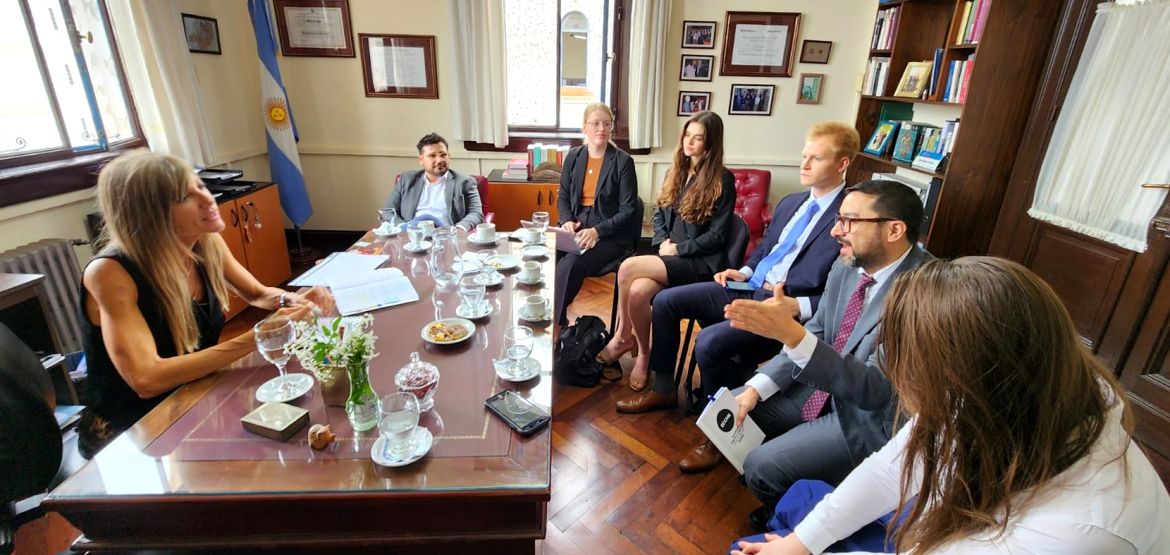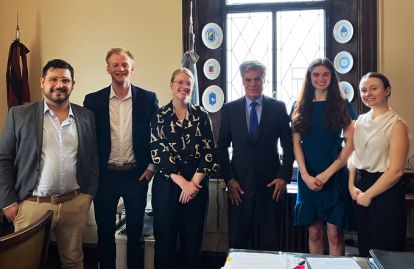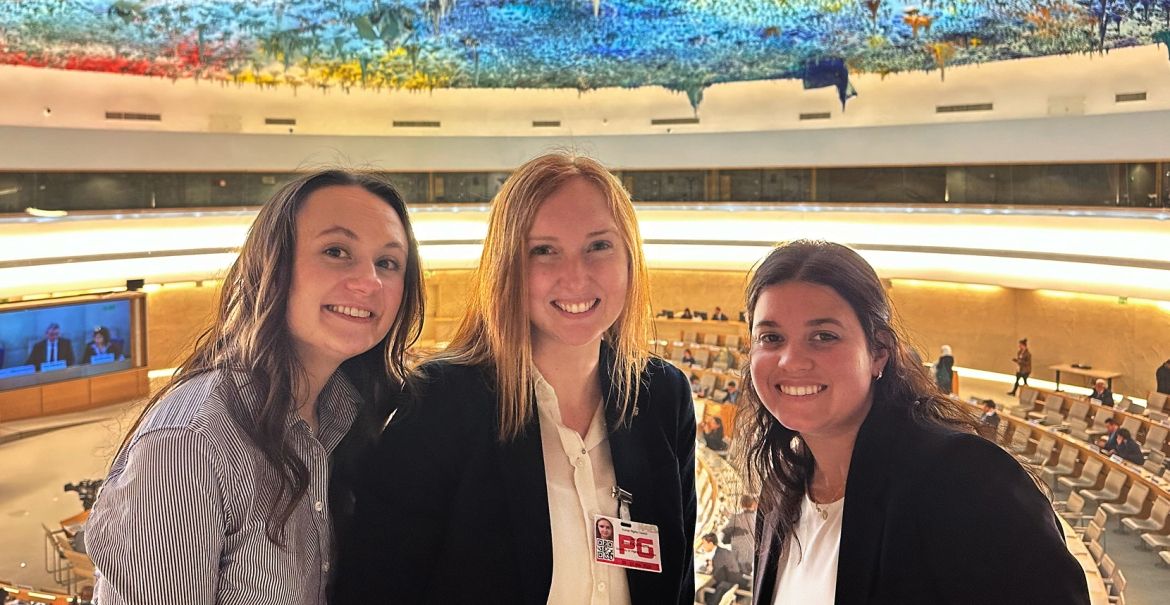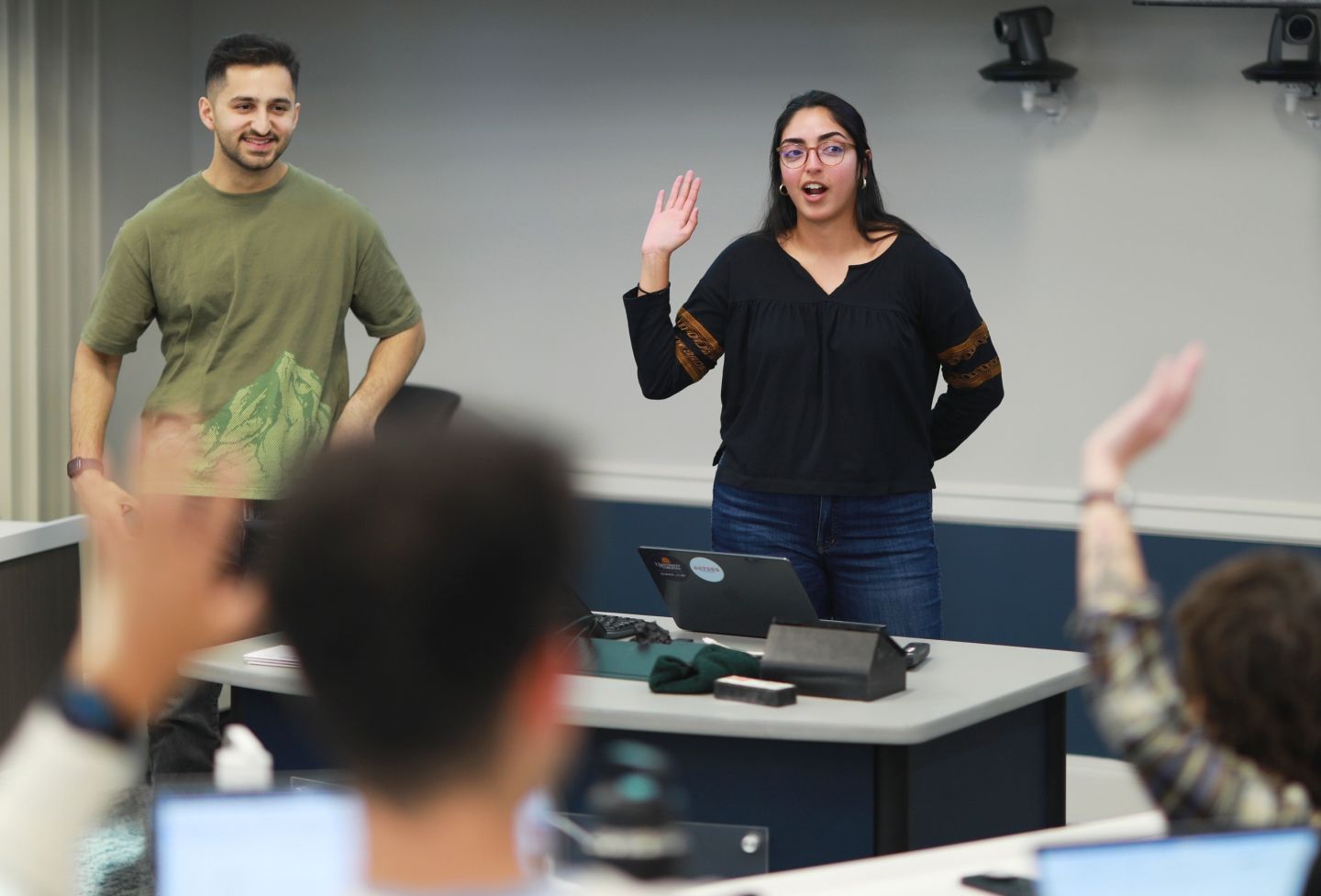In recent months, Professor Camilo Sánchez and several of his students logged over 17,000 miles working on human rights issues as part of the International Human Rights Law Clinic he directs at the University of Virginia School of Law.
Over spring break, Sánchez traveled with four students to Salta Province in northern Argentina on a criminal justice reform project conducted under the auspices of the U.S. State Department. Then later in March, Sánchez and three students attended the 55th session of the United Nations Human Rights Council, held at the U.N. headquarters in Geneva, Switzerland.
“Traveling across continents — and from a Spanish-speaking nation to a French-speaking one — was undoubtedly exhausting, yet the invaluable learning and significant impact on our clients and projects made it entirely worthwhile,” Sánchez said.
The U.S. Embassy in Argentina had worked with the State Department’s Diplomacy Lab to find a team of university researchers to evaluate and report back on how the country is handling its transition to an adversarial federal criminal justice system and away from an “inquisitorial” model. Once common in Latin America and still prevalent across much of continental Europe, the inquisitorial model allows judges to conduct their own investigations, rather than tasking each party with marshaling their evidence and presenting their case.

A team of clinic students — which included Zach Zamoff ’25, Chloe Chiles ’25, Lillie Stephens ’25 and Grace Zipperer ’24 — worked on the project. Luis Santiago Genovesi, a current LL.M. student and Sánchez’s research assistant, also joined the students for the research.
The students personally interviewed judges, prosecutors and public defenders involved in the reform, accompanied by Jessica Kuhn and Jérémie Swinnen from the U.S. Embassy in Argentina. The team met with the ambassador on their return and presented their findings to the Diplomacy Lab.
“It was pretty remarkable — we had dinner with the top judge, the top prosecutor and the top public defender in Salta,” Zamoff said. “I was really grateful for the opportunity to learn from these people, and it really showed me the value of public service.”
The students learned firsthand how the new system has improved justice administration in the regions where it is being implemented, including faster, more transparent justice and a more strategic approach to combating federal crimes affecting the area, according to Sánchez. It also “humanizes” justice, by shifting from an emphasis on written filings to in-person hearings that increase the contact between defendants and the justice system.
“A lot of these reforms are trying to meet the ideals of Argentina’s founding fathers, who included the right to a jury trial in their constitution,” Zamoff said. “Argentina’s Constitution is very much based on the U.S. Constitution, and the rights of the accused are more compatible with an adversarial system.”
Before traveling to Argentina, the students started working on the project in the fall term, conducting document research and interviews with judges, prosecutors, public defenders, litigating attorneys, government officials and Argentine academics to learn more about the transition and its challenges.
The students met with Marc Stanley, the U.S. ambassador to Argentina, who is a former trial lawyer. Stanley was “eager” to hear their initial impressions and advise on the ongoing research process for the Diplomacy Lab report, Sánchez said.

The students shared their preliminary results April 19 at the Diplomacy Lab Fair at the State Department in Washington, D.C., in a presentation to State Department officers, peers from the DipLab network and representatives from other federal agencies.
Twelve thousand miles later, Sánchez, Zipperer and two other students — Sabrina Mato ’24 and Jessica Williams ’25 — were in Geneva to observe the work of independent experts who report to the U.N. Human Rights Council on their human rights investigations in various countries of concern.
The clinic advises several partners on similar matters, so Sánchez said it was crucial to observe the interaction between independent experts, governments and civil society members. Understanding the council’s modus operandi enables the clinic to safely advise clients who need assurances of anonymity and protection, Sánchez said.
“We strategically chose to attend during the presentations of reports by special rapporteurs and investigative missions — panels of three independent experts — on country situations like Iran, Syria, Ukraine, Venezuela and North Korea, as these are most relevant to our clinic’s cases,” Sánchez said.
After a rapporteur or investigative mission presents its report to the council, the state under scrutiny is given the opportunity to respond. To foster an “interactive dialogue,” the president of the council then opens the floor to comments from other states and civil society organizations, Sánchez said.
The sessions made a particular impression on Mato, who left Cuba with her family as a child. Cuba is a member of the U.N. Human Rights Council, despite U.S. concerns about its human rights record and treatment of political dissidents.
“Having just gone back there a couple months ago to visit family, the actual situation there is really heartbreaking,” Mato said. “It was very frustrating to me to hear their representative talk the U.N. lingo about supporting human rights.”
Still, she was struck by how much advocacy and dialogue is going on informally behind the scenes.
“There are a lot of informal chats, like coffee chats and side conversations, and it seems like people are willing to talk,” Mato said. “There is a lot of change being made, we’re just not seeing it as the public — we only see their final two-minute speech.”
Mato plans to work on pro bono immigration law matters when she joins Reed Smith after graduation.

Zipperer, who attended a session on Syria, has worked extensively with Syrian refugees. She has been awarded a two-year fellowship from Immigrant Justice Corps to work for the Empire Justice Center on behalf of unaccompanied children seeking asylum.
The U.N. Human Rights Council sessions also attract various experts, academics and seasoned human rights defenders, according to Sánchez. The students met with Professor Elizabeth Salmon of the Pontifical Catholic University of Peru, who is the first female special rapporteur on North Korea; lawyer Anexa Alfred, an expert on the rights of indigenous people; and professionals from the Global Centre for the Responsibility to Protect.
“Attending the Human Rights Council sessions was highly instructive, particularly in regard to my work as an advocate for refugees,” Zipperer said. “From interviewing criminal justice attorneys in Argentina to meeting with attorneys and professionals at the U.N., the field experiences in this clinic far exceeded my expectations.”
Some of the sessions were held in the iconic Human Rights and Alliance of Civilizations Room at the Palais des Nations in Geneva. An enormous art installation by Miquel Barceló hangs from the center of the room’s ceiling, 100 tons of paint hand-sculpted into multi-hued stalactites.
“They say the ceiling reflects the complexity and diversity of the human condition,” Sánchez said. “I think it’s such a privilege for our students to travel and directly encounter the diverse complexities of human rights, from local to global levels, and all their interactions.”
Founded in 1819, the University of Virginia School of Law is the second-oldest continuously operating law school in the nation. Consistently ranked among the top law schools, Virginia is a world-renowned training ground for distinguished lawyers and public servants, instilling in them a commitment to leadership, integrity and community service.


